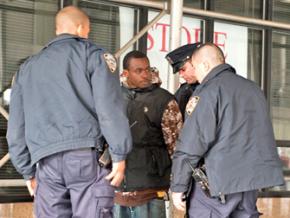Facing an occupying army in New York
reports on one face of the scandal of police abuse in New York.
NEW YORK City public housing residents and community organizations have joined forces in support of the class-action lawsuit Floyd v. City of New York. The historic case, now being heard in a federal courtroom, challenges the constitutionality of the New York Police Department's "stop-and-frisk" program of racial profiling.
Residents of New York City Housing Authority (NYCHA) properties have packed the courtroom to stand against the NYPD's policy of stopping and harassing residents, overwhelmingly Blacks and Latinos, with residents of public housing serving as a special target.
Stop-and-frisk is one component of a larger NYPD strategy called "Operation Impact," which was launched by Mayor Michael Bloomberg and Police Commissioner Ray Kelly. Their defense of this initiative is that it helps "keep guns off the street. But in reality, guns have been seized in only 0.15 percent of all stops.
New York police have made a total of 5 million stops in the past 11 years, and in 86 percent of cases, the victim was Black or Latino. It couldn't be more obvious that "stop-and-frisk" is nothing more than systemic racial profiling. In fact, the stop-and-frisks of people of color are roughly equal to the entire population of Blacks and Latinos living in New York.

One particular group disproportionately targeted under stop-and-frisk is public housing residents. Although NYCHA residents are only about 5 percent of the total population, they have been subjected to between 11 and 15 percent of all documented stops, according to Families United for Racial & Economic Equality (FUREE). Among those stopped and accused of trespassing, 94 percent were Black or Latino.
The result, of course, is to spread fear among NYCHA residents that at any time--while in their own housing complex--they or a relative or a visitor will be subjected to a stop by police, including the potential for violence that goes with that. Plus, NYCHA families face the threat of eviction if charges or complaints are made against their household.
Carmen Negron, a resident of Baruch Houses, described for FUREE the typical outcome of an encounter with police patrolling NYCHA complexes:
Several months ago, I asked my 22-year-old son to go get our mail. I realized that it had taken him longer than usual to return and just as I was beginning to get dressed to go downstairs, there was a loud knock on my door. When I opened it, there was my son and two officers.
The officer said he was loitering in the lobby and had no identification on him. I explained that he just went to the lobby to get the mail, and that he had the key to the mailbox, which could have verified that he is a resident here. They were belligerent and did not want to listen to me. They even ended up threatening me that if they would have decided to place a complaint against us, our tenancy could have been in jeopardy.
And this is exactly the sort of reaction that Bloomberg and Kelly are hoping for. Kelly has admitted that the stop-and-frisk program is specifically designed to intimidate young Blacks and Latinos. In testimony at the Floyd trial, state Sen. Eric Adams, a 22-year veteran of the NYPD, recalled a 2010 meeting with Kelly in which the commissioner "stated that he targeted and focused on [Black and Latino people] because he want to instill fear in them that every time that they left their homes they could be targeted by the police."
THE POLICE presence in public housing areas and the hostility they exhibit leads NYCHA residents to compare what they experience to living under an occupation.
Police have imposed the equivalent of checkpoints in all NYCHA developments, using the threat of trespass charges against residents from going out. Arnaldo Arzu, a Bronx resident and member of Community Voice Heard, described the consequences:
As a lifelong Black male resident of Mott Haven Houses, I can't walk into my house or buy milk for my daughter in the next development without being stopped and frisked or without the threat of arrest. I have filed over 30 complaints, and nothing ever happens, not even a notice that my complaint has been registered. We deserve to live with respect and dignity.
Bloomberg and Kelly have a strong motive for preventing poor people of color from developing a sense of community. During the Floyd trial, lawyers played an audio tape secretly made at a Brooklyn station house, in which an unidentified speaker says: "If you get too big of a crowd there, they are going to get out of control, and they are going to think they own the block. We own the block. They don't own the block. They might live there, but we own the block. We own the streets here."
But in spite of systematic oppression and brutalization at the hands of the NYPD, communities of color in New York City are coming together to fight back.
The fact that "stop-and-frisk" has been put on trial is a victory for our side and testament to an emerging movement speaking out against police harassment and violence. Struggles at the grassroots are critical in putting pressure on the city to get rid of stop-and-frisk--as well as putting resources into critical social investment such as public schools and housing.


